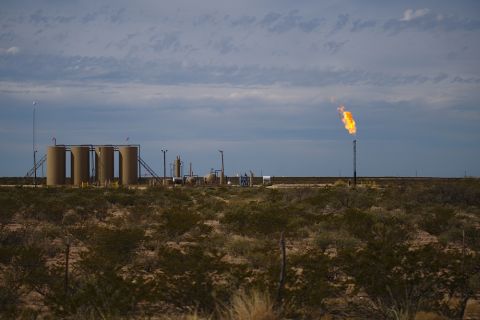Oil, gas and related stocks did not escape the price volatility that characterized markets during 2002's first half but they finished the period close to where they began, while general markets wound up significantly lower. The results are a significant change from recent years, when Petroleum Finance Week newsletter's group of more than 200 energy equities lagged general markets' growth. During the first six months, it proved more resistant overall to share-price declines, finishing 2.5 points higher, or nearly 0.1%, at 2,688.13 on July 3, 2002, than its 2,685.63 points on Dec. 28, 2001. In the same period, the S&P 500 dropped nearly 17.5% to 953.98; the Dow Jones Industrial Average fell almost 10.7% to 9,054.97; and the Nasdaq composite plunged 30.6% to 1,380.10. The oils outperformed general markets essentially for three reasons, Wall Street oil analysts said. "First, there was added tension in the Middle East, which caused concerns about the general oil supply. That took oil prices considerably above the projected framework of the low 20s," says George J. Gaspar of Robert W. Baird & Co. Inc., Milwaukee. "Second was an emerging decline in natural gas deliverability that was very well identified with first-quarter gas output for 25 major gas producers." It produced a 3.2% quarter-to-quarter sequential decline and a 4.3% year-to-year drop in output. "Third was the sharp reduction in surplus gas, year-to-year. It started to come down hard from 1.1 trillion cubic feet at the end of 2001 to less than 400 billion cubic feet now." "What coalesced, literally, the first week of February was the darkest hour of storage, psychologically," says Robert L. Christensen Jr. of First Albany Corp., New York. "Fourth-quarter well-production reports showed U.S. wellhead supplies were falling more rapidly than general expectations. Several important surveys-notably the Institute of Supply Management (ISM) Index-showed that U.S. industrial production was expanding. Finally, Middle East conflicts intensified, and several people began to consider the possibility of an oil-supply interruption. That worked against the prevailing negative psychology of high gas storage."
Recommended Reading
Midstream Operators See Strong NGL Performance in Q4
2024-02-20 - Export demand drives a record fourth quarter as companies including Enterprise Products Partners, MPLX and Williams look to expand in the NGL market.
TC Energy’s Keystone Back Online After Temporary Service Halt
2024-03-10 - As Canada’s pipeline network runs full, producers are anxious for the Trans Mountain Expansion to come online.
Waha NatGas Prices Go Negative
2024-03-14 - An Enterprise Partners executive said conditions make for a strong LNG export market at an industry lunch on March 14.
Equitrans Delays WV-VA Mountain Valley Natgas Pipe Again, Boosts Cost
2024-02-20 - U.S. energy firm Equitrans Midstream delayed the estimated completion of its Mountain Valley natural gas pipeline from West Virginia to Virginia to the second quarter from the first quarter due in part to adverse weather in January.
Targa Expects Another Major Permian Pipeline Project This Year
2024-05-03 - Targa Resources says different projects are falling in place for gas capacity expansion




